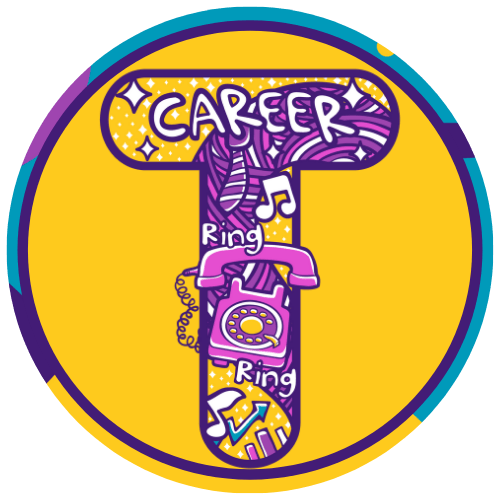Twisted Career Speaks

Alright folks, here’s the lowdown on what you need to get rid of on your resume! Before you shoot it off to your dream job, take a moment to scrub these 10 things off your resume. Trust me, doing this will bring your most marketable accomplishments to the forefront instead of being hidden in the fluff!

Navigating the interview process can feel like walking through a maze, right? You’re on a mission to find that perfect job, but it's not just about impressing potential employers. It's equally important to keep your eyes peeled for those subtle (and sometimes not-so-subtle) warning signs that might indicate a workplace isn't the right fit for you. Here are 10 red flags that deserve your attention during an interview!

Setting boundaries at work is like installing an invisible fence for your well-being—it keeps the good stuff in and the not-so-good stuff out. It's about maintaining that sweet spot where you feel productive, respected, and downright good about your job. Ready to be the architect of your own professional Zen garden?

Since unemployment is currently on the rise (10.2%) and layoffs are a reality, this question has been asked several times. And though the internet is filled with guesstimates, estimates, and crystal ball theories, they are all just educated guesses driven by unstable variables.
The Bureau of Labor Statistics has done most of the heavy lifting and reported back in May 2020 that the average duration of a job search was 7.7 weeks, so roughly two months. But that figure is meaningless to those that have been unemployed for 3-4 months to-date. This data is unfortunately based on a Pre-COVID-19 economy, and due to the record-high unemployment claims, it’s not a good indication of our new reality.

Regardless of how hard the economy is hit, some industries will always be in demand. These industries will continue to grow while providing innovation and technological developments to the masses. Over the decades, some industries attempt to keep up with the rapidly changing demands while using archaic traditional methods only to become obsolete and made irrelevant by innovative technology.
Some industries are flat out necessary for our safety and survival. Industries that cater to our essential existence will always continue to grow and be in high demand.
For this reason, here are the top 5 industries that aren’t going anyway soon.

First and foremost, stop asking for advice from your family, friends, & coworkers on how to pursue your career journey when many of them haven’t even figured out their own.
Then you have the Negative Nelly and Debbie Downer that will talk you right out of pursing potential opportunities.
Though a recession may have decreased the potential opportunities in some industries, it has created opportunities in others. You have to do your homework and understand how your skills transfer to the new emerging markets.

When people think of recession, they visualize mass layoffs, downsizing, plummeting sales, bailouts, and bankruptcies. That is nothing more than a long spelling for CHANGE . A little known fact about recessions---they are the epicenter for innovation . They push the boundaries of survival and existence. Either you make the cut, change, and adapt or become irrelevant and obsolete. We have seen many examples of companies that have gone up in flames because they couldn’t keep up with the economic shift and the new way we do business. Employment is no different. As companies make the necessary changes to remain significant and still provide a product or service that the market demands, they are also creating new opportunities to support this new market space. A good example would be the K-12 and Higher Education industry . When everything shifted online, the demand for instructional designers, course creators, digital developers, LMS Administrators tripled overnight. I know this may not be the most popular opinion, but there is a silver lining in every dark cloud. That being said, here are five benefits of making a career change during a recession. It forces you to identify your passions It puts you in a position to re-evaluate your professional desires and helps you discover how it all fits in the changing economy. If you were recently laid off, were you relieved? Did you feel a weight lifted off your shoulders? Was there a moment of indifference or just “another job” mentality? If you answered "yes" to any of these questions, this recession was the momentum you needed to depart from a job that you already mentally checked out of a long time ago. It makes you re-examine your skills As the economy changes, new market demands surface. New market demands may require new processes, technology, and methodology. Are your skills up-to-date with the current market? If not, this is the perfect time to get that certification, take that class, or even learn a new skill to add to your resume. Your soft and hard skills will be one of the best differentiators between you and your competition. Check out Udemy, Coursera, and edX. They offer industry-specific courses that will give you the cutting-edge skills to make you more marketable to employers. It reduces competition You may be thinking, “If there are mass layoffs and high unemployment, how is my competition reduced?” As brutal as this may sound, you will see "Survival of the fittest" at play. This phrase originated from Darwinian evolutionary theory, which suggested that only the best adjusted to their environment are the most successful in surviving. In other words, many will not enhance their skills set, for whatever reason, and simply retire out of the workforce. Many will pursue their passion and switch career paths entirely. Many will take demotions and re-enter the workforce in entry-level positions, and many will start their own businesses. The list goes on and on, and hopefully, you get my point. As the competition thins out, you should be taking the necessary steps to STAND OUT! It forces you to think outside the box A recession will drive you in a position to make an intentional decision to distinguish yourself from the flock. You will learn to become more creative with your actions. Only applying to random job openings will not be enough. You will learn to have a laser focus on your goals and may even have to re-brand yourself and skill sets to meet the new demand. What are some accomplishments that make you unique? What is your elevator pitch? If you need help crafting your professional story, schedule a Power Hour Call to take your creativity to the next level. It forces you to have hindsight It gives you the ability to understand your current situation only after it has happened. Some job seekers saw the writing on the wall BEFORE the recession. What prevented you from taking action? What are some things you could’ve done to prepare for unemployment? What are some things you would've done differently? A recession will put things in perspective and force you to take precautionary measures for the worst in the future. Sound off 📢 What are some other benefits that you’ve observed during a recession that has helped your career change? Be Kind & SHARE! 💌 About the author Bridget Baggett is a Career Strategist and a Diversity Consultant that assist professionals with their career journey. She helps career-oriented professionals navigate the competitive workforce by setting attainable career goals that lead to gainful employment, promotions, salary increases, and meaningful career changes. She is the founder of the Twisted Career Society, a network of professionals that inspires, educates, and innovates the global workforce.


